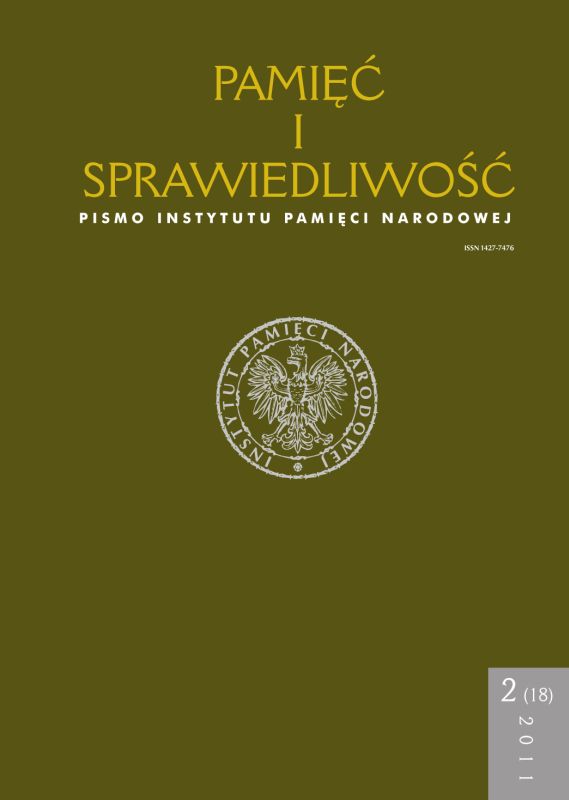Rozłam pomiędzy „totalitaryzmem” a „demokracją” Czechosłowacki rok 1989 – możliwości
Pamięć i Sprawiedliwość, Tom 18 Nr 2 (2011), strony: 13-52
Data publikacji: 2011-12-30
Abstrakt
Bibliografia
H.G. Skilling, Czechoslovakia’s Interrupted Revolution, Princeton (New Jersey) 1976 P. Kenney, Karneval revoluce: Střední Evropa 1989, Praha 2005 O. Tŭma, Nejhorší možná varianta: Srpen 1968, „Soudobé dějiny” 2009, nr 2 J. Tesař, Mnichovský komplex: Jeho příčiny a důsledky, Praha 2000 J. Burckhardt, Úvahy o světových dějinách, tłum. Jiří Loser, Olomouc 1996 V. Biľak, Poučení z krizového vývoje ve straně a společnosti po XIII. sjezdu KSČ: Rezoluce k aktuálním otázkám jednoty strany, Praha 1978 F. Palacký, Psaní do Frankfurtu [w:] Český liberalismus: Texty a osobnosti, red. M. Znoj, J. Havránek, M. Sekera, Praha 1995 L. Doležel, Fikce a historie v období postmoderny, Praha 2008 N. Ferguson, Virtuální dějiny: O ‘chaotické’ teorii minulosti [w:] Virtuální dějiny: Historické alternativy, Praha 2001 K. Durman, Útěk od praporů: Kreml a krize impéria 1964–1991, Praha 1998 M. Gorbaczow, Żyzń i rieformy, t. 1–2, Moskwa 1995 W. Miedwiediew, Raspad. Kak on nazriewał w „mirowoj sistiemie socyalizma”, Moskwa 1995 W. Musatow, Priedwiestniki buri. Politiczeskije krizisy w Wostocznoj Jewropie (1956–1981), Moskwa 1996 P. Tigrid, Zpráva o stavu střední Evropy, „Svědectví” 1989, nr 87 A. Müllerová, V. Hanzel, Albertov 16:00: Příběhy sametové revoluce. Nové skutečnosti, osobní svědectví, unikátní materiály, Praha 2009 M. Jakeš, Dva roky generálním tajemníkem, Praha 1996 M. Dolejší, Analýza 17. listopadu 1989, Loket nad Ohrzą 1990 J. Suk, Občanské fórum. Listopad – prosinec 1989, t. 1: Události. Ústav pro soudobé dějiny AV ČR, Praha 1997 M. Vacek, Teď když máme, co mnozí chtěli, Praha 2008 V. Hanzel, Zrychlený tep dějin: Reálné drama o deseti jednáních. Autentické záznamy jednání Občanského fóra a Verejnosti proti násiliu s představiteli státní moci v listopadu a prosinci 1989, Praha 2006 Č. Císař, Paměti: Nejen o zákulisí Pražského jara, Praha 2005 V. Havel, Spisy, t. 4: Eseje a jiné texty z let 1970–1989, red. J. Šulc, Praha 1999 K prosazení kandidatury Václava Havla na úřad prezidenta: Dokumenty a svědectví, red. J. Suk, „Soudobé dějiny” 1999, nr 2–3 P. Jarolímek, Zákony o navracení majetku KSČ a SSM lidu, „Soudobé dějiny” 2001, nr 1 P. Žaček, „Sachergate”: První lustrační aféra. Nesnáze postkomunistické elity (nejen) se svazky Státní bezpečnosti, „Paměť a dějiny” 2007, nr 1 J. Suk, Politické hry s „nedokončenou revolucí”: Účtování s komunismem v čase Občanského fóra a po jeho rozpadu (1989–1992), „Soudobé dějiny” 2009, nr 2–3 H.G. Skilling, Czechoslovakia’s Interrupted Revolution, Princeton (New Jersey) 1976 P. Kenney, Karneval revoluce: Střední Evropa 1989, Praha 2005 O. Tŭma, Nejhorší možná varianta: Srpen 1968, „Soudobé dějiny” 2009, nr 2 J. Tesař, Mnichovský komplex: Jeho příčiny a důsledky, Praha 2000 J. Burckhardt, Úvahy o světových dějinách, tłum. Jiří Loser, Olomouc 1996 V. Biľak, Poučení z krizového vývoje ve straně a společnosti po XIII. sjezdu KSČ: Rezoluce k aktuálním otázkám jednoty strany, Praha 1978 F. Palacký, Psaní do Frankfurtu [w:] Český liberalismus: Texty a osobnosti, red. M. Znoj, J. Havránek, M. Sekera, Praha 1995 L. Doležel, Fikce a historie v období postmoderny, Praha 2008 N. Ferguson, Virtuální dějiny: O ‘chaotické’ teorii minulosti [w:] Virtuální dějiny: Historické alternativy, Praha 2001 K. Durman, Útěk od praporů: Kreml a krize impéria 1964–1991, Praha 1998 M. Gorbaczow, Żyzń i rieformy, t. 1–2, Moskwa 1995 W. Miedwiediew, Raspad. Kak on nazriewał w „mirowoj sistiemie socyalizma”, Moskwa 1995 W. Musatow, Priedwiestniki buri. Politiczeskije krizisy w Wostocznoj Jewropie (1956–1981), Moskwa 1996 P. Tigrid, Zpráva o stavu střední Evropy, „Svědectví” 1989, nr 87 A. Müllerová, V. Hanzel, Albertov 16:00: Příběhy sametové revoluce. Nové skutečnosti, osobní svědectví, unikátní materiály, Praha 2009 M. Jakeš, Dva roky generálním tajemníkem, Praha 1996 M. Dolejší, Analýza 17. listopadu 1989, Loket nad Ohrzą 1990 J. Suk, Občanské fórum. Listopad – prosinec 1989, t. 1: Události. Ústav pro soudobé dějiny AV ČR, Praha 1997 M. Vacek, Teď když máme, co mnozí chtěli, Praha 2008 V. Hanzel, Zrychlený tep dějin: Reálné drama o deseti jednáních. Autentické záznamy jednání Občanského fóra a Verejnosti proti násiliu s představiteli státní moci v listopadu a prosinci 1989, Praha 2006 Č. Císař, Paměti: Nejen o zákulisí Pražského jara, Praha 2005 V. Havel, Spisy, t. 4: Eseje a jiné texty z let 1970–1989, red. J. Šulc, Praha 1999 K prosazení kandidatury Václava Havla na úřad prezidenta: Dokumenty a svědectví, red. J. Suk, „Soudobé dějiny” 1999, nr 2–3 P. Jarolímek, Zákony o navracení majetku KSČ a SSM lidu, „Soudobé dějiny” 2001, nr 1 P. Žaček, „Sachergate”: První lustrační aféra. Nesnáze postkomunistické elity (nejen) se svazky Státní bezpečnosti, „Paměť a dějiny” 2007, nr 1 J. Suk, Politické hry s „nedokončenou revolucí”: Účtování s komunismem v čase Občanského fóra a po jeho rozpadu (1989–1992), „Soudobé dějiny” 2009, nr 2–3
 Język Polski
Język Polski
 English
English
 Deutsch
Deutsch
 Français (France)
Français (France)
 Italiano
Italiano
 Русский
Русский


 PDF
PDF
